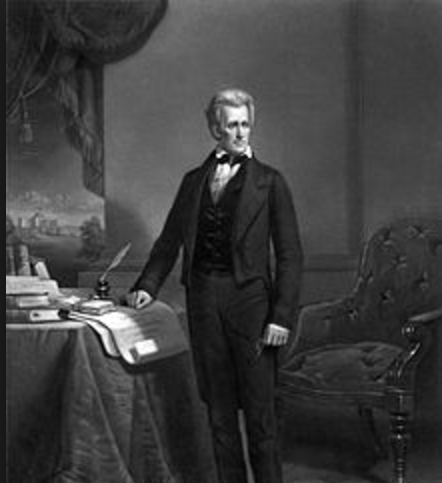Andrew Jackson was the seventh President of the United States, serving from 1829-1837. His supporters believe him to be one of the most democratic presidents; however, many question how democratic Jackson really was. A multitude of Jackson’s actions were questionable to say the least. The press played a role in his presidency by both demonizing him and by trying to persuade the public to believe his arguably inhumane acts were acceptable. To this day, Jackson’s presidency continues to be one of the most controversial presidencies in American history.
Jackson was born in poverty and grew up to be a successful lawyer in Tennessee. After leading the United States in the War of 1812, he became a national hero and boosted his political reputation. Jackson became the first person to serve in the House of Representatives from Tennessee. In 1824, Jackson ran for President but lost to John Quincy Adams in a tight race. Jackson’s campaign resonated with the common person, allowing him to easily rally supporters. Four years later Jackson ran again, this time as the leader of the Democratic Party. On March 4, 1829, Jackson took office after winning the election by a landslide. Jackson won the vote from many Americans in 1828 by promising to be a man for the people, the most democratic president yet.
Jackson initiated a power shift in the country from the east to the west, marking a pivotal turning point in American politics. Two strong political groups formed during the “Jacksonian era”- “pro-Jacksonites” (democrats) and “anti-Jacksonites” or Whig Party. Whigs believed that Jackson was creating an autocracy and worked to fight against his monarch-like ways. A popular political cartoon at the time was one where Jackson was depicted holding a staff and wearing a crown–like a British monarch.
When Jackson took office, he had already begun to receive negative press coverage. Jackson’s presidency began with a scandal: he and his wife, Rachel, were accused of adultery because Rachel had never divorced her first husband. Rachel was ripped apart by the press–the first time a president’s wife was ever attacked by the media. That marked the beginning of the press’ close scrutiny of Jackson and in turn Jackson’s growing hatred of the press.
Jackson would continue to receive negative press coverage throughout his presidency, especially for the Indian Act Removal. The Indian Removal Act epitomized Jackson’s controversial presidency, the act displaced thousands of Native Americans from their homes all over the east coast. This caused a lot of negative attention to fall on Jackson. The press ridiculed Jackson for his deportation of American Indians from their native lands. The natives gave Andrew Jackson the nickname “Sharp Knife” to show their disapproval of him.
As leader of the Democratic Party, Jackson was considered very Democratic, but there is some debate about how democratic he really was. His advocacy of states’ rights and expansion of slavery into the western territory are two arguments to support him being Democratic. However, one of the main conflicts between Democrats and the Whig Party was large banks; Jackson and his supporters were against them. This conflict led to the United States Bank crisis in South Carolina. During the bank crisis, Jackson was once again ridiculed, this time by supporters of the Whig Party who wanted to keep the National Bank, which Jackson had decided to remove funds from the bank and end it.
Over the course of his political career, Jackson went from a national hero to a villain in the eyes of the press. However, Jackson left the White House more liked than when he entered. As a young politician, Jackson gained support by identifying with the common man. This and his recognition as a war hero allowed Jackson to eventually become the President of the United States. Unfortunately, as president, Jackson did not get the same support from the media that he got during his campaign. His negative actions were heightened by media coverage, swaying the minds of many Americans. While opinions on Jackson vary, it is clear that the press’s attitude towards Jackson was not a favorable one.




































